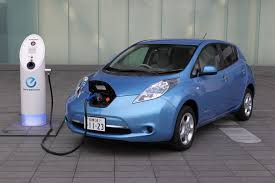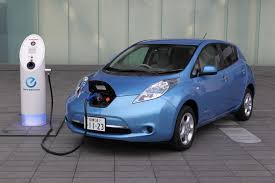
Even as policymakers scale back subsidies aimed at building sales from relatively low levels and consider tapping the brakes on sales quotas for plug-in cars, China's auto industry is charging ahead with aggressive plans to electrify cars.
To show off numerous battery electric and plug-in hybrid models, industry executives will use the Shanghai Motor Show, which opens to the public on Friday. But batteries capable of delivering the same driving range as gasoline cars are still too expensive, any are worried.
Electric cars have generated little consumer interest in China except for the fact that China the world's leading market in this segment due to rise in green energy car sales dramatically driven by government policies. Compared to China's overall auto market of 28 million vehicles sold last year, electric cars make up less than 2 percent.
Including state-owned Beijing Automotive Group, and Warren Buffett-backed BYD, the dominant players in China's electric vehicle market are local. Most cars are relatively cheap with limited range.
Automakers will be required to substantially boost sales of so-called "new energy vehicles" (NEVs), or risk being penalized according to proposals floated by Beijing's central government. But in a move, that could deepen manufacturers' losses on such models and discourage consumers from buying them, it is cutting subsidies on green cars by a fifth this year at the same time.
A self-sustained market for electric vehicles will be created and automakers will be weaned off government support by reducing subsidies gradually to 2020, say policymakers. Car makers wil be compelled to rely more on electrification to boost average fuel efficiency despite the drop-off in subsidies by tightening fuel efficiency regulations through 2020, industry officials and experts reckon.
China will insist on more electric vehicles, and to be ready, they must invest in developing those vehicles now, in the long term, industry executives say.
"We're not holding back anything. The requirements whether they get changed or adjusted or whatever, the bottom line is clear that electrification is going to play a bigger and bigger role ... in China and other markets as well," Ford Motor Co CEO Mark Fields told reporters at a pre-show event this month.
with each green vehicle getting a different number of credits depending on the level of electrification and driving range, automakers would be asked to ultimately generate green car credits equivalent to 12 percent of annual sales volume with NEVs by around 2020 by Beijing, say industry executives.
For years, Automakers and government officials have been bargaining over China's electric vehicle policy.
by selling battery electric or plug-in hybrid vehicles, a proposal for automakers that they generate credits equivalent to 8 percent of automakers' sales next year, was placed in the latest draft policy released in September by Beijing. That will be raised to 10 percent in 2019 and 12 percent in 2020.
Automakers would have little choice but to comply whatever target the government sets.
According to the China Association of Automobile Manufacturers, albeit at a slower 5 percent, China is the world's biggest auto market by far, and growth is set to continue this year.
That is why automakers are scrambling to develop more plug-in electric hybrids and electric battery cars for China even as they fight electric vehicle mandates in the United States.
(Source:www.reuters.com)
To show off numerous battery electric and plug-in hybrid models, industry executives will use the Shanghai Motor Show, which opens to the public on Friday. But batteries capable of delivering the same driving range as gasoline cars are still too expensive, any are worried.
Electric cars have generated little consumer interest in China except for the fact that China the world's leading market in this segment due to rise in green energy car sales dramatically driven by government policies. Compared to China's overall auto market of 28 million vehicles sold last year, electric cars make up less than 2 percent.
Including state-owned Beijing Automotive Group, and Warren Buffett-backed BYD, the dominant players in China's electric vehicle market are local. Most cars are relatively cheap with limited range.
Automakers will be required to substantially boost sales of so-called "new energy vehicles" (NEVs), or risk being penalized according to proposals floated by Beijing's central government. But in a move, that could deepen manufacturers' losses on such models and discourage consumers from buying them, it is cutting subsidies on green cars by a fifth this year at the same time.
A self-sustained market for electric vehicles will be created and automakers will be weaned off government support by reducing subsidies gradually to 2020, say policymakers. Car makers wil be compelled to rely more on electrification to boost average fuel efficiency despite the drop-off in subsidies by tightening fuel efficiency regulations through 2020, industry officials and experts reckon.
China will insist on more electric vehicles, and to be ready, they must invest in developing those vehicles now, in the long term, industry executives say.
"We're not holding back anything. The requirements whether they get changed or adjusted or whatever, the bottom line is clear that electrification is going to play a bigger and bigger role ... in China and other markets as well," Ford Motor Co CEO Mark Fields told reporters at a pre-show event this month.
with each green vehicle getting a different number of credits depending on the level of electrification and driving range, automakers would be asked to ultimately generate green car credits equivalent to 12 percent of annual sales volume with NEVs by around 2020 by Beijing, say industry executives.
For years, Automakers and government officials have been bargaining over China's electric vehicle policy.
by selling battery electric or plug-in hybrid vehicles, a proposal for automakers that they generate credits equivalent to 8 percent of automakers' sales next year, was placed in the latest draft policy released in September by Beijing. That will be raised to 10 percent in 2019 and 12 percent in 2020.
Automakers would have little choice but to comply whatever target the government sets.
According to the China Association of Automobile Manufacturers, albeit at a slower 5 percent, China is the world's biggest auto market by far, and growth is set to continue this year.
That is why automakers are scrambling to develop more plug-in electric hybrids and electric battery cars for China even as they fight electric vehicle mandates in the United States.
(Source:www.reuters.com)





